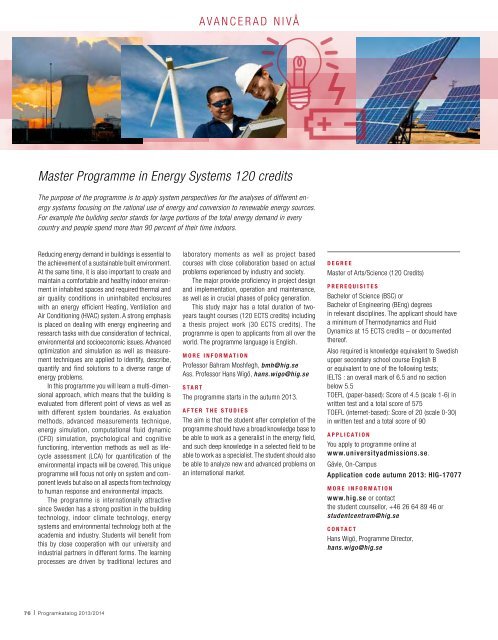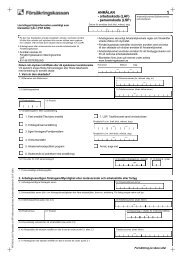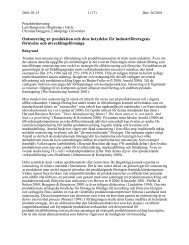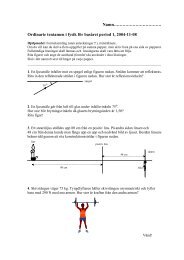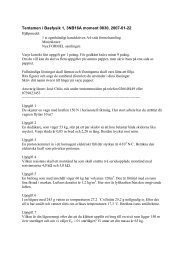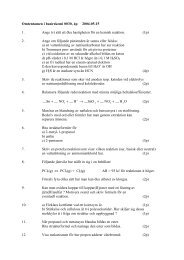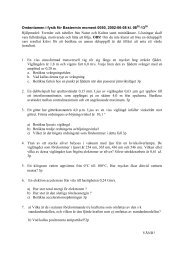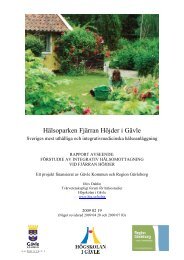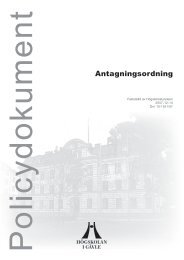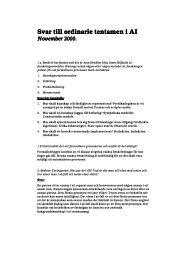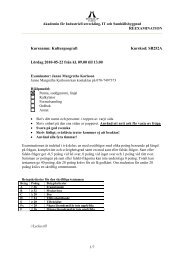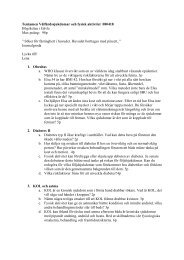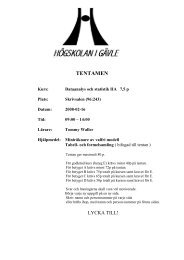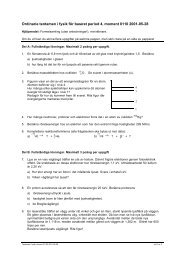Programkatalog_2013-2014 - Högskolan i Gävle
Programkatalog_2013-2014 - Högskolan i Gävle
Programkatalog_2013-2014 - Högskolan i Gävle
You also want an ePaper? Increase the reach of your titles
YUMPU automatically turns print PDFs into web optimized ePapers that Google loves.
avancerad nivå<br />
Master Programme in Energy Systems 120 credits<br />
The purpose of the programme is to apply system perspectives for the analyses of different energy<br />
systems focusing on the rational use of energy and conversion to renewable energy sources.<br />
For example the building sector stands for large portions of the total energy demand in every<br />
country and people spend more than 90 percent of their time indoors.<br />
Reducing energy demand in buildings is essential to<br />
the achievement of a sustainable built environment.<br />
At the same time, it is also important to create and<br />
maintain a comfortable and healthy indoor environment<br />
in inhabited spaces and required thermal and<br />
air quality conditions in uninhabited enclosures<br />
with an energy efficient Heating, Ventilation and<br />
Air Conditioning (Hvac) system. A strong emphasis<br />
is placed on dealing with energy engineering and<br />
research tasks with due consideration of technical,<br />
environmental and socioeconomic issues. Advanced<br />
optimization and simulation as well as measurement<br />
techniques are applied to identify, describe,<br />
quantify and find solutions to a diverse range of<br />
energy problems.<br />
In this programme you will learn a multi-dimensional<br />
approach, which means that the building is<br />
evaluated from different point of views as well as<br />
with different system boundaries. As evaluation<br />
methods, advanced measurements technique,<br />
energy simulation, computational fluid dynamic<br />
(CFD) simulation, psychological and cognitive<br />
functioning, intervention methods as well as lifecycle<br />
assessment (LCA) for quantification of the<br />
environmental impacts will be covered. This unique<br />
programme will focus not only on system and component<br />
levels but also on all aspects from technology<br />
to human response and environmental impacts.<br />
The programme is internationally attractive<br />
since Sweden has a strong position in the building<br />
technology, indoor climate technology, energy<br />
systems and environmental technology both at the<br />
academia and industry. Students will benefit from<br />
this by close cooperation with our university and<br />
industrial partners in different forms. The learning<br />
processes are driven by traditional lectures and<br />
laboratory moments as well as project based<br />
courses with close collaboration based on actual<br />
problems experienced by industry and society.<br />
The major provide proficiency in project design<br />
and implementation, operation and maintenance,<br />
as well as in crucial phases of policy generation.<br />
This study major has a total duration of twoyears<br />
taught courses (120 ECTS credits) including<br />
a thesis project work (30 ECTS credits). The<br />
programme is open to applicants from all over the<br />
world. The programme language is English.<br />
MORE INFORMATION<br />
Professor Bahram Moshfegh, bmh@hig.se<br />
Ass. Professor Hans Wigö, hans.wigo@hig.se<br />
Start<br />
The programme starts in the autumn <strong>2013</strong>.<br />
After the studies<br />
The aim is that the student after completion of the<br />
programme should have a broad know ledge base to<br />
be able to work as a generalist in the energy field,<br />
and such deep knowledge in a selected field to be<br />
able to work as a specialist. The student should also<br />
be able to analyze new and advanced problems on<br />
an international market.<br />
Degree<br />
Master of Arts/Science (120 Credits)<br />
Prerequisites<br />
Bachelor of Science (BSC) or<br />
Bachelor of Engineering (BEng) degrees<br />
in relevant disciplines. The applicant should have<br />
a minimum of Thermodynamics and Fluid<br />
Dynamics at 15 ECTS credits – or documented<br />
thereof.<br />
Also required is knowledge equivalent to Swedish<br />
upper secondary school course English B<br />
or equivalent to one of the following tests;<br />
IELTS : an overall mark of 6.5 and no section<br />
below 5.5<br />
TOEFL (paper-based): Score of 4.5 (scale 1-6) in<br />
written test and a total score of 575<br />
TOEFL (internet-based): Score of 20 (scale 0-30)<br />
in written test and a total score of 90<br />
Application<br />
You apply to programme online at<br />
www.universityadmissions.se.<br />
Gävle, On-Campus<br />
Application code autumn <strong>2013</strong>: HIG-17077<br />
More information<br />
www.hig.se or contact<br />
the student counsellor, +46 26 64 89 46 or<br />
studentcentrum@hig.se<br />
Contact<br />
Hans Wigö, Programme Director,<br />
hans.wigo@hig.se<br />
76 I <strong>Programkatalog</strong> <strong>2013</strong>/<strong>2014</strong>


